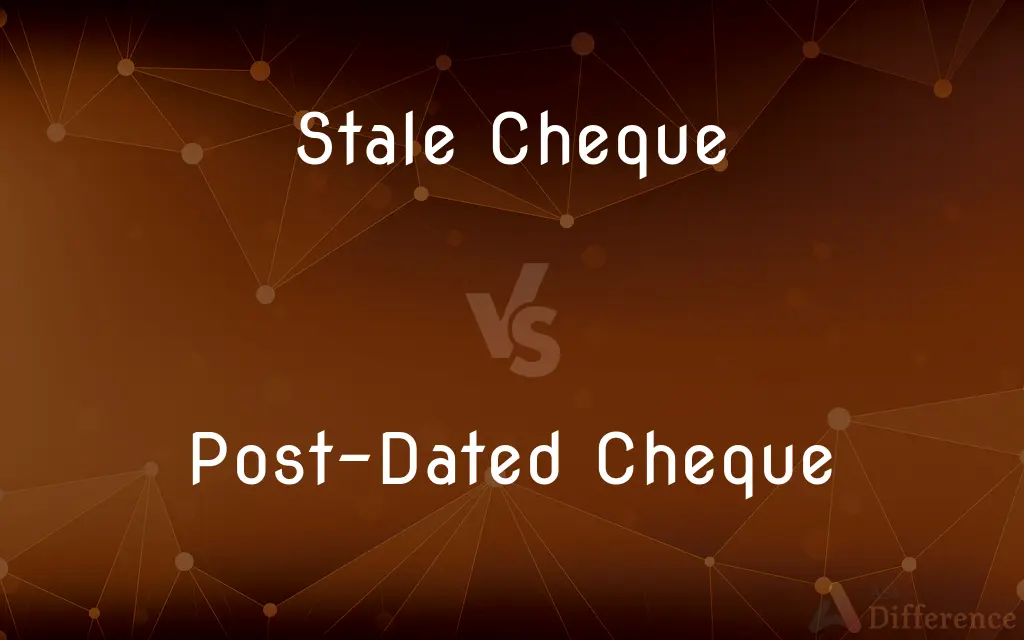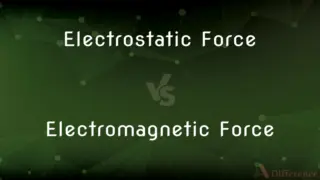Stale Cheque vs. Post-Dated Cheque — What's the Difference?
By Tayyaba Rehman — Published on December 20, 2023
A Stale Cheque is one not presented within a specific time from its date, making it invalid, while a Post-Dated Cheque carries a date in the future and shouldn't be cashed until that date.

Difference Between Stale Cheque and Post-Dated Cheque
Table of Contents
ADVERTISEMENT
Key Differences
Stale Cheque and Post-Dated Cheque are terms associated with banking and financial transactions. A Stale Cheque refers to a cheque that has not been presented for payment within a certain period (typically six months) from the date it was written. After this time, the cheque becomes "stale" and banks are not obligated to honor it. It essentially loses its validity, and the person holding it may not be able to get the funds unless a new cheque is issued.
Conversely, a Post-Dated Cheque is one written by the drawer with a future date. This means that the cheque should not be presented or cashed until that specified future date arrives. It's a way for the drawer to ensure the payee doesn't access the funds before a certain time. The usage might be for postdated rent payments, installment payments, or any other agreement where future payment is intended.
While both Stale Cheque and Post-Dated Cheque deal with the timing of a cheque's cashing, their implications are different. A Stale Cheque indicates negligence or forgetfulness in cashing a cheque within the requisite timeframe, making it ineffective. In contrast, a Post-Dated Cheque is purposefully dated for the future, indicating a deliberate intent to delay the cashing of the cheque.
It's crucial for both drawers and payees to understand the differences. For those writing a cheque, knowing when the funds might be withdrawn is essential for account management. For those receiving a cheque, understanding the limitations of when they can access the funds is equally vital. In either case, being unaware of the characteristics of Stale Cheques and Post-Dated Cheques can lead to financial misunderstandings or complications.
Comparison Chart
Definition
A cheque not cashed within a specific timeframe.
A cheque written with a date in the future.
ADVERTISEMENT
Validity
Becomes invalid after the specific period.
Becomes valid only on or after the specified date.
Purpose
Not intentional; results from delay in presenting.
Intentionally dated for the future to delay cashing.
Bank's Obligation
Not obligated to honor after it becomes stale.
Not to be cashed until the date on the cheque arrives.
Common Implication
Forgotten or neglected by the holder.
A deliberate delay in payment by the drawer.
Compare with Definitions
Stale Cheque
A cheque not presented within its valid period.
I forgot to deposit the cheque and now it's a Stale Cheque.
Post-Dated Cheque
A cheque that delays the withdrawal of funds.
She handed me a Post-Dated Cheque, so I'll wait to deposit it.
Stale Cheque
A financial document that's expired due to non-presentation.
I missed the window and have a Stale Cheque on hand.
Post-Dated Cheque
A cheque bearing a future date for cashing.
I gave my landlord a Post-Dated Cheque for next month's rent.
Stale Cheque
A banking instrument that loses its validity due to time.
Banks won't honor the Stale Cheque I have.
Post-Dated Cheque
A cheque guaranteeing payment on a specific upcoming date.
The Post-Dated Cheque is for the first of next month.
Stale Cheque
An uncashed cheque that's beyond its acceptable date.
I should have cashed this earlier; it's now a Stale Cheque.
Post-Dated Cheque
A written order for payment that's not effective until a later date.
The Post-Dated Cheque ensures I won't be charged until the 15th.
Stale Cheque
A cheque rendered unusable after crossing its cashing timeframe.
My Stale Cheque was rejected by the bank.
Post-Dated Cheque
A banking instrument signaling intent for future payment.
To manage my finances, I often use a Post-Dated Cheque.
Common Curiosities
What is a Stale Cheque?
A cheque not presented for cashing within a certain timeframe, usually six months.
How is a Post-Dated Cheque different from a Stale Cheque?
A Post-Dated Cheque is written with a future date, while a Stale Cheque hasn't been cashed within its valid period.
When can I cash a Post-Dated Cheque?
Only on or after the date written on the cheque.
Can I cash a Stale Cheque?
Typically, banks are not obligated to honor Stale Cheques.
Can I deposit a Post-Dated Cheque early?
You can deposit it, but it shouldn't be cashed until the specified date.
Is there a fee for depositing a Stale Cheque?
Banks might charge a fee if they reject a Stale Cheque.
How can I avoid having a Stale Cheque?
Ensure to cash or deposit cheques promptly.
What happens if I try to deposit a Stale Cheque?
The bank may reject it due to its stale status.
Is it illegal to issue a Stale Cheque?
No, but it becomes invalid and the bank may not honor it.
Why would someone issue a Post-Dated Cheque?
To ensure the recipient doesn't cash it before a specific date.
Is it safe to give someone a Post-Dated Cheque?
It depends on trust; the cheque should only be cashed on or after the specified date.
Can a Post-Dated Cheque become stale?
Yes, if not cashed within the standard period after its written date, it can become stale.
Are there legal implications for cashing a Post-Dated Cheque early?
It can be considered a breach of trust or agreement between parties.
Why would a cheque become stale?
If it's not presented for cashing within the specified period, usually six months.
Can I request a new cheque if I have a Stale Cheque?
Yes, you can request the issuer to provide a new cheque.
Share Your Discovery

Previous Comparison
Electrostatic Force vs. Electromagnetic Force
Next Comparison
F1 vs. Grand PrixAuthor Spotlight
Written by
Tayyaba RehmanTayyaba Rehman is a distinguished writer, currently serving as a primary contributor to askdifference.com. As a researcher in semantics and etymology, Tayyaba's passion for the complexity of languages and their distinctions has found a perfect home on the platform. Tayyaba delves into the intricacies of language, distinguishing between commonly confused words and phrases, thereby providing clarity for readers worldwide.












































